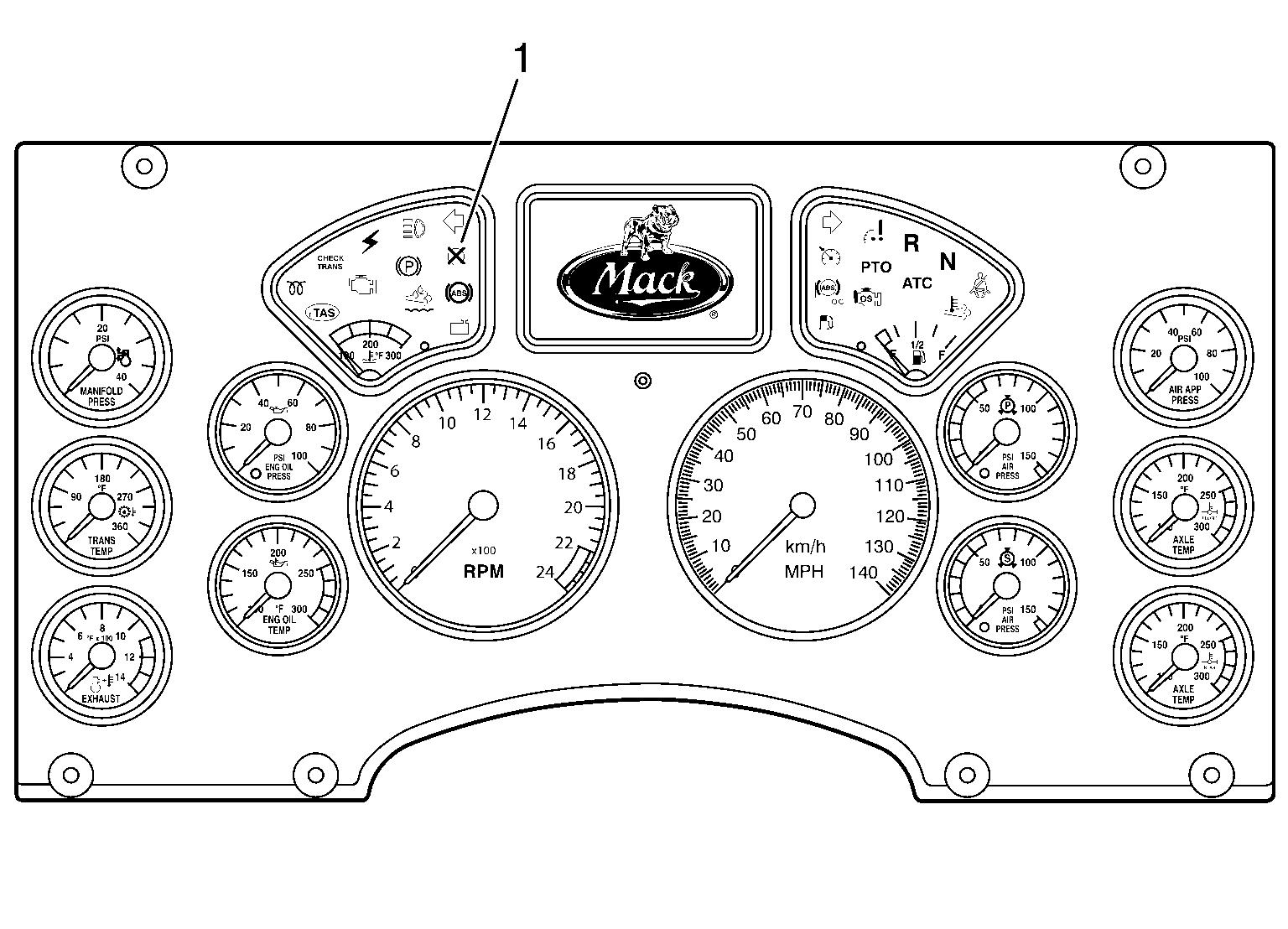
2 minute read
Shutdown W arning Indicator
from Mack Truck Electronic V-MAC IV Vehicle Management & Control with Co-Pilot Display Operator’s Manual
The Shutdown W arning indicator , red color , illuminates the engine coolant level (ECL) below the minimum level the engine oil pressure (EOL) below the minimum the engine coolant temperature (ECT) aftertreatment diesel particulate filter (DPF) soot level trigger are above the maximum Some vehicles also have optional shutdown functions available when the transmission temperature engine exhaust gas temperatures (EGT) are above maximum allowable
During a shutdown vehicle management and control - MAC) also provides audible The alarm will also sound and the red shutdown indicator will turn when vehicle management and control - MAC) detects a problem excessive periods Shutting the engine down
The shutdown warning indicator usually located the left - hand side the dash cluster .
W3036501 vehicle management and control - MAC) can programmed actually shut down the engine conditions warrant (low coolant, low EOL, high engine oil temperature (EOT), high ECT , high engine EGT high automatic transmission oil temperature equipped). Shutdown mandatory for crankcase pressure (CCP). W ith this option enabled, the engine will automatically shut down within approximately seconds after the red SHUTDOWN indicator turns and the alarm activates (provided the vehicle not moving above the road speed threshold).
Engine Derate
For some conditions (see table below), engine derate can occur first and a condition worsens, then engine shutdown can occur
Condition Engine Dera
Intake
Manifold Air T emperatur e
Derate starts 120°C (248°F). Full derate (100%) occurs when temperature 140°C (284°F).
Engine T urbocharger
Derate starts 245°C (473°F). T que derated down 100% 250°C (482°F).
Compr essor Outlet T emperatur e
Engine Exhaust Gas Recir culation (EGR) T emperatur e temperature exceeds 220°C (428°F) for more than seconds with a second derate starts. temperature reaches 240°C (464°F), a 100% derate
Crankcase essur e (CCP) a change pressure (dif ference between the CCP and barometric pressure (BARO)) rises about 5 kPa ( 0.725 psi ) with fset & 0.5 kPa/s ( 0.07 psi/s ) and stays over 5 kPa ( 0.725 psi ) for more than 80% the time during 1 second, the engine will fully derate forced and shut
High Engine Coolant T emperatur e (ECT)
Derate starts 106.75°C ( 224.15°F ) and ramps down 12% T orque kept constant until the temperature reaches 107.25°C ( 225.05°F
Derate starts again 107.4°C ( 225.32°F) and ramps down 32% derate.
Engine Shutdown Indica T Lights
engine warning engine warning engine warning
Engine shutdown. Red engine shutdown indicator
Amber malfunction indicator lights 107.2°C ( 224.96°F
Red engine shutdown indicator lights 108°C ( 226.4°F
T orque derated down 100% 108.4°C ( 227.12°F Engine shutdown temperature rises 109°C ( 228.2°F
Condition Engine Dera
Engine Oil T emperatur e (EOT)
Derate starts with 10% derate 129°C ( 264.2°F ) more for 75% a 4 second 132°C ( 269.6°F ) a 100% derate occurs.
Engine Shutdown Indica T Lights
Engine shutdown temperature rises 135°C ( 275°F
Amber malfunction indicator lights when temperature 129°C ( 264.2°F
Red engine shutdown indicator lights when temperature 131°C ( 267.8°F
After etr eatment Diesel Particulate Filter (DPF) Soot
For Catalyzed A TS: Derate starts when soot trigger ratio and continues down 20% derate.
Amber malfunction indicator lights when soot trigger ratio 1.4.
For Catalyzed A TS: T orque ramped down 80% derate when soot trigger ratio 1.7.
Red engine shutdown indicator lights when soot trigger ratio 1.7.
For Non - Catalyzed A TS: Derate starts when soot trigger ratio Amber malfunction indicator lights when soot trigger ratio
For Non - Catalyzed A TS: T orque ramped down 40% derate when soot trigger ratio Full derate occurs when soot trigger ratio
Engine T urbocharger Wheel
For 1 1 and liter engines, derate starts Full derate (100%) occurs
For liter engines, derate starts Full derate (100%) occurs
Red engine shutdown indicator lights when soot trigger ratio engine warning
* - A (Aftertreatment Please refer page for information the Exhaust Aftertreatment









